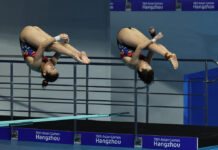
KUALA LUMPUR – Swimming, unlike the more mainstream sports in Malaysia such as football and badminton, has always been faced with challenges in accessibility and acceptance across certain quarters of society.
While public pools are scarce, swimming pools are commonly found in condominiums, apartments and gated housing schemes, albeit not always Olympic-sized.
Lack of accessibility has led to swimming being considered an expensive sport, with parents often paying between RM160 and RM350 a month for private coaching lessons.
The absence of awareness regarding the importance of swimming, even from a survival perspective, has also led to a decline in top-notch swimmers produced by Malaysia in previous years, such as Nurul Huda Abdullah, Jeffrey Ong and Alex Lim, who were once among Asia’s best.
With Youth and Sports Minister Hannah Yeoh recently calling for increased investment by the state governments in swimming and diving infrastructure and athlete development, this plea raises a crucial question: How can more athletes be developed when the sport is not widely accepted?

Speaking to Scoop, sports analyst Mohd Sadek Mustafa said that developing swimming talent would be challenging without widespread acceptance of the sport.
“It’s never going to be easy to develop a larger pool of talent for the country when the sport is still not fully accessible and accepted by society.
“Not all quarters of society are involved in swimming, and with the sport being seen as expensive, only those from the upper middle class and lower upper class can afford to send their kids for this sport in the modern era.
“On top of that, certain quarters of society still view the sport as taboo due to the revealing outfits worn. Hence, that’s the reason why we see less representation from certain communities in the sport, with most athletes hailing from the Chinese community.
“Rather than focusing on infrastructure to develop more athletes, state governments should try to come up with formulas to promote the sport and make it more accessible. One of the best ways is to explain to society the importance of swimming and the kinds of benefits it can bring to one’s health and how it can be an advantage as a survival skill,” said Sadek when contacted.
Sadek, a senior sports science lecturer at Universiti Teknologi Mara, said the Youth and Sports Ministry should work together with the Education Ministry to introduce swimming lessons in public schools, similar to Singapore.
It was reported that Singapore’s Education Ministry made swimming part of physical education lessons for its public school students in 2018.
The island nation, with a 5.6 million population, boasts an Olympic champion swimmer, Joseph Schooling, who won a gold medal in the 100m butterfly at the 2016 Rio Olympics.
For now, swimming is only part of the syllabus in most international schools in Malaysia.

“Swimming needs to be part of the syllabus in schools in our country so that our children can be exposed to the sport from a younger age. I wonder why we are lagging behind in this aspect when our neighbours clearly know the importance of swimming.
“Everything needs to start at the school level if we want to develop more talent for the country through the sport. Just as badminton, football and basketball are accessible at schools, swimming should also be made mandatory.
“We have many swimming instructors and trainers in the country, and the Sports Ministry needs to work together with the Education Ministry to bring these instructors into the schools for our children.
“By doing this, even parents will have the confidence to allow their kids to swim without worrying about their safety. Until these changes are made, we will struggle and continue having problems nurturing top talent in the sport for the country,” Sadek added.
In 2018, it was reported that then-education minister Maszlee Malik announced that swimming would be introduced as a co-curricular activity and that it would take off with schools located near public swimming pools.
However, nothing more was heard of the programme after Maszlee resigned from his position in 2020. – June 17, 2024



